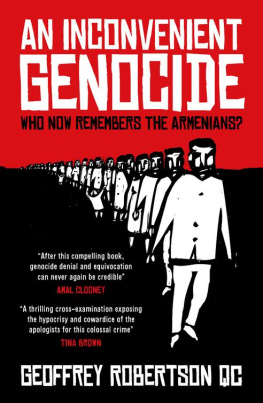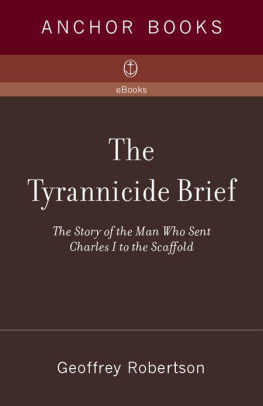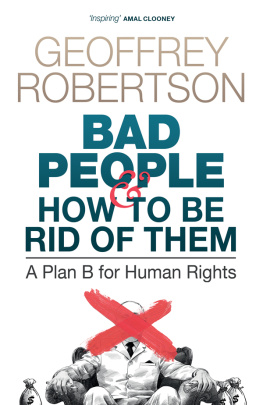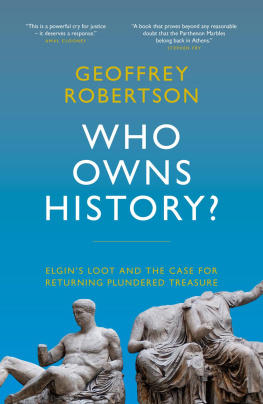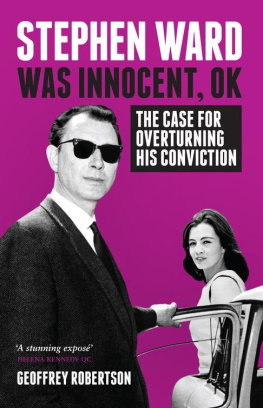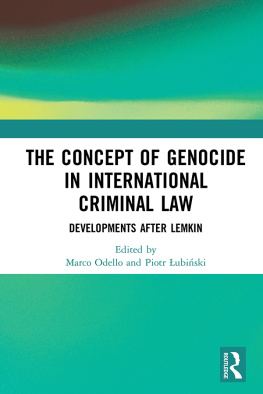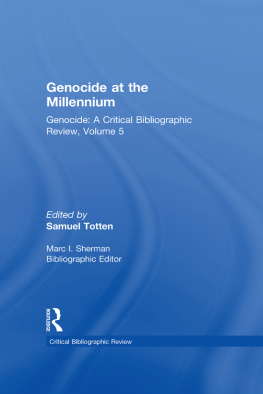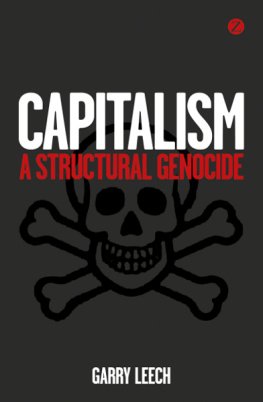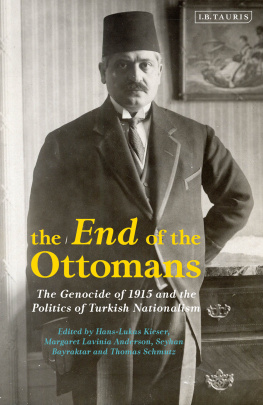Geoffrey Robertson takes us into the courtroom of history for a thrilling cross-examination exposing the hypocrisy and cowardice of the apologists for this colossal crime the extermination of over half the Armenians in Turkey. Forty-three of our states recognise this as genocide, so why cant the United States?
TINA BROWN
Geoffrey Robertson proves the genocidal intent behind the atrocities afflicted on the Armenians. After this compelling book, genocide denial and equivocation can never again be credible.
AMAL CLOONEY
With a brilliant display of forensic advocacy, one of the greatest legal minds on the international stage forces a shameful but inconvenient truth upon the world. A shocking indictment!
HELENA KENNEDY QC
Geoffrey Robertson, with his usual forensic brilliance, makes the case for justice for the Armenian victims of the 1915 massacre. A must-read for those who want to understand the relationship between victims of unrequited international crimes and justice, not just historically, but also in the here and now.
SIR KEIR STARMER KCB QC
A devastating, searing indictment of complicity and cover-up over the extermination of one million people.
PETER HAIN MP
Brilliant, forensic and irrefutable An Inconvenient Genocide should be compulsory reading Very few books are necessary, but this is one.
THE AUSTRALIAN
Argues the Armenian corner with informed eloquence.
MATTHEW PARRIS, THE SPECTATOR
It is not because he comes from an Armenian background that he is drawn to the subject: it is his consciousness as a human rights advocate that guides him.
NEW STATESMAN
The Armenian massacre was the greatest crime of the war, and the failure to act against Turkey is to condone it; because the failure to deal radically with the Turkish horror means that all talk of guaranteeing the future peace of the world is mischievous nonsense; and because when we now refuse to war with Turkey we show that our announcement that we meant to make the world safe for democracy was insincere claptrap.
Theodore Roosevelt, 1918
I have sent my Deaths Head units to the East with the order to kill without mercy men, women and children of the Polish race or language. Only in such a way will we win the lebensraum that we need. Who, after all, speaks today of the annihilation of the Armenians?
Adolf Hitler, in Obersalzburg, 22 August 1939,
urging his generals to show no mercy in Poland
CONTENTS
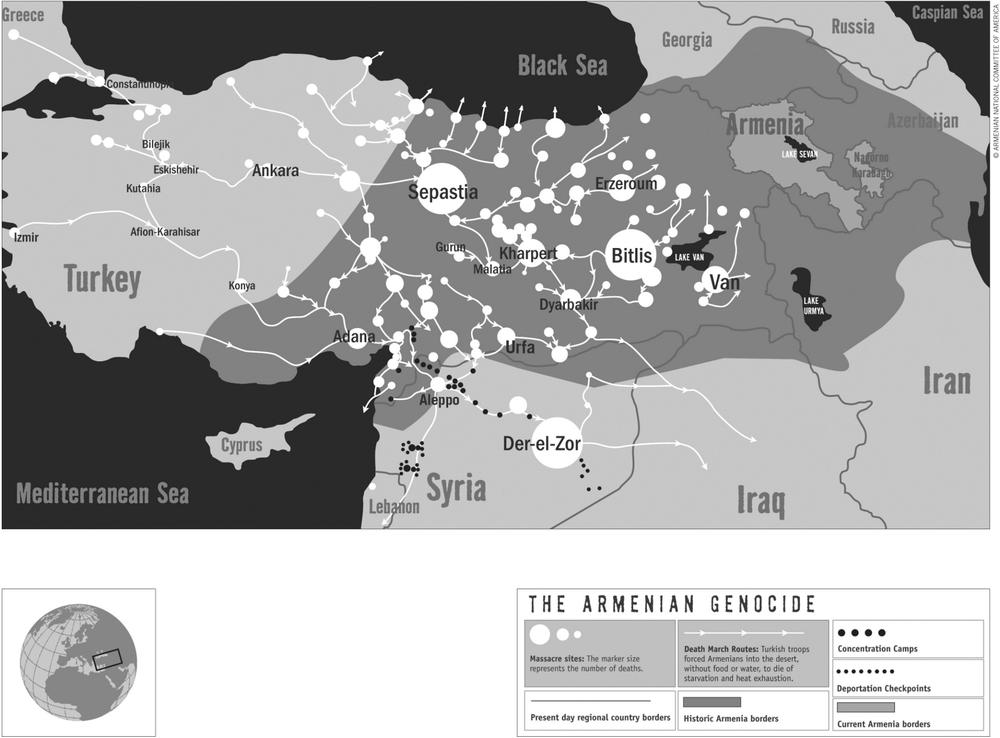
A DOLF HITLER SUMMONED his generals to a villa in Salzburg on 22 August 1939 and, in a shockingly brutal speech, urged them to show no mercy towards women and children when invading Poland. There would be no retribution, because who, after all, speaks today of the annihilation of the Armenians? He was encouraging them to believe they would have the same impunity that the 1923 Treaty of Lausanne had allowed to Ottoman politicians who oversaw, in 1915, the extermination of over half the Armenian race, by rounding up and killing community leaders, executing their able-bodied men and then sending their women, children and old men to face death in the Syrian desert. The Ottoman Turks may not have used gas chambers, but they used death squads and death marches, starvation and typhus-ridden concentration camps situated in places we have only heard of today because they are being overrun by ISIS. The evidence of genocidal intent is plain from the laws passed in 191516 to seize and sell homes and lands and churches, because the government had decided the Armenians were not coming back. One hundred years later, the question of its responsibility for their torment returns.
This book, written for the centenary of the Armenian genocide, has the object of proving beyond reasonable doubt that what happened was genocide, as that concept is now defined in international law. Shortly after the Ottomans opportunistically threw in their lot with the Axis powers in 1914, they began to eliminate their minorities. First they came for the Greeks, who at least had a homeland to which they could be deported. Then for the Armenians, most of whom were slaughtered, and lastly for the Assyrians, a third of whom were killed. These people were not, as the present Turkish government would have the world believe, just some of the many victims of the First World War. Nor were hundreds of thousands of women, old men and young children an enemy within which had to be eliminated to win that war. They were not casualties of war at all: the war was the cover for their mass murder by the state.
This book the only extensive treatment of the question by an international jurist sets out the undeniable historical facts, and applies to those facts the law as it is stated in the 1948 Genocide Convention and more recently by international courts. The result is clear: members of the Young Turk government committed genocide because it was their intention to destroy a substantial part of the Armenian people, which they proceeded to do. And even if Ottoman leaders did not have that special intent, they were all indubitably guilty of committing a crime against humanity. Turkey, neuralgic about use of the G-word, refuses to own up even to this, and maintains barefacedly that it was justified in relocating (i.e. marching to death Armenian families after murdering their menfolk) as a matter of military necessity.
What has given the subject its importance is the obsessive and massively funded denialist campaign by Turkey, backed by threats to close its air bases to countries which use the G-word. This puts the US and the UK in a quandary saying the obvious, in order to console the Armenians, is politically inconvenient whilst the Middle East remains in conflagration. But Turkish denialism has other consequences it amounts morally to the last act of the 1915 genocide, punishing the children and grandchildren by refusing to acknowledge that their forebears were victims of an international crime. It perverts the law of war, with arguments for the legitimacy of mass killing of civilians whenever the military end may justify the murderous means. And it underwrites a movement to confine the crime of genocide to events that are equivalent to the Holocaust to which, of course, there is no equivalence. This movement is supported by diplomats and real-politicians who are discomfited by the legal duty imposed on states by the Genocide Convention, namely the duty to enforce the law against genocide.
So the centenary, on 24 April 2015, was an important re-assertion of the concept of genocide as a crime for which there can be no impunity and which requires international enforcement. Pope Francis set the scene, creating a diplomatic rift with Turkey by describing the slaughter of the Armenians as the first genocide of the twentieth century. The Pope is not infallible it was in fact the second, after the German army massacres of the Herero people in 1905 but genocide it certainly was. The Pontiff confronted Turkish denialism head-on: Concealing or denying evil is like allowing a wound to keep bleeding without bandaging it. He received no intelligible response, other than a graceless withdrawal of Turkish envoys from the Vatican.
The centenary was marked by the publication of new historical scholarship verifying the racist motivation behind the slaughter, as well as artistic and literary attempts to bridge two nations that remain divided. That was then, this is now was the message, but it has so far fallen on deaf ears in Turkey, which declines to apologise, and Armenia, which refuses to forget. A solemn commemoration in Yerevan was attended by Presidents Putin and Hollande, and other national leaders. President Obama, who knows that the slaughter was genocide (see p.10), did not show up or even dare to voice his opinion, although Joe Biden and Samantha Power, in their personal capacities, did subsequently attend a commemoration service with the President of Armenia in Washington.

